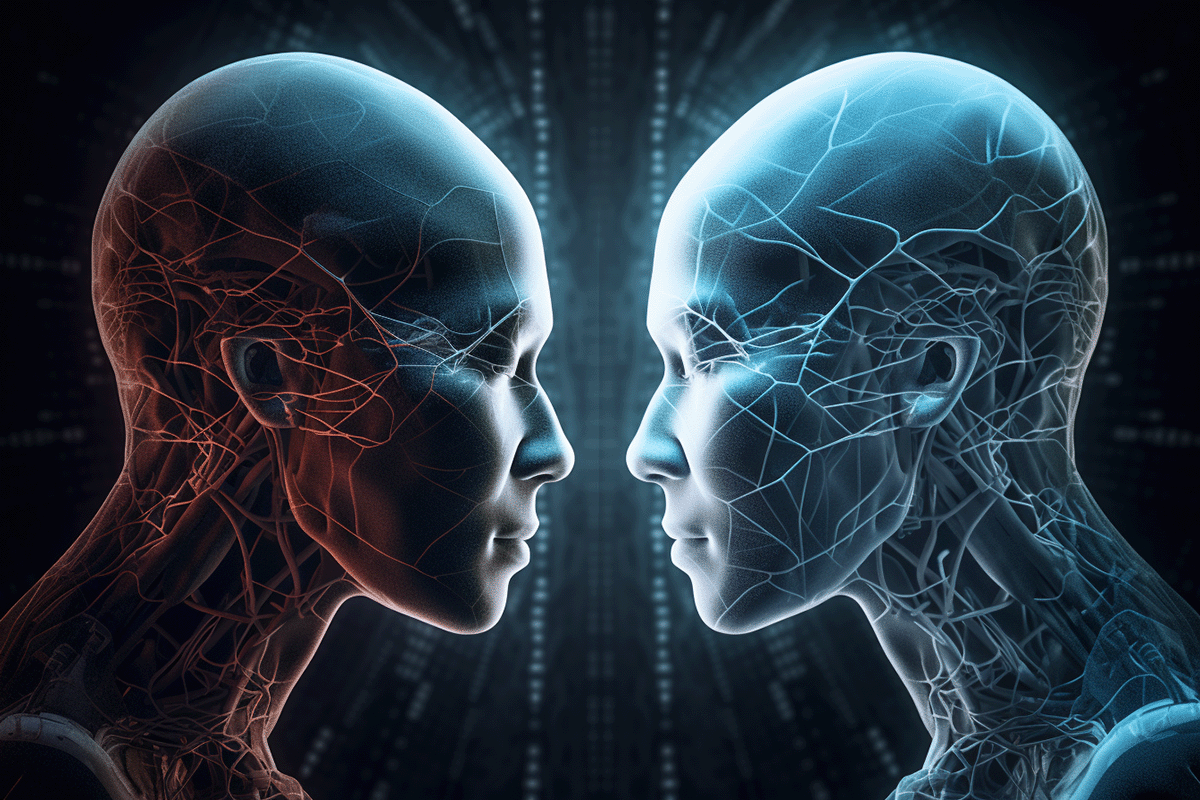Addressing Power Dynamics Crucial for AI Development to Benefit Humanity
- 6 minutes read - 1271 words
Table of Contents
Humanity’s position as the dominant species on Earth and its ability to exploit its resources could be disrupted by increasingly powerful AI systems. This could threaten human privileges and status.
Developing AI systems that align with human values and goals is crucial. Fostering open dialogue, collaboration, and understanding among various stakeholders is necessary to achieve this.
A multidisciplinary approach is also essential to address AI’s potential risks and negative consequences and ensure that technology serves humanity’s best interests._
This text is based on Interview with an AI about philosophy (GPT-4) .
Power Dynamics and the Human Perception of AI
Humanity, as the dominant species on Earth, has long enjoyed numerous privileges, including the ability to exploit the planet’s resources. However, the advent of increasingly powerful AI systems could disrupt this hierarchy and challenge humanity’s position at the top.
As AI becomes more powerful and influential, it can be seen as a threat to human privileges, status, and survival. This perspective can shape the public discourse around AI and influence policy decisions, research priorities, and social attitudes.
Humanity has been dominant on Earth for a long time and has exploited its resources for its benefit. This has led to a sense of superiority and entitlement among humans. However, the emergence of advanced AI systems threatens this status quo.
As AI systems become more intelligent and influential, they have the potential to challenge human supremacy and disrupt the existing power structures.
This shift in power dynamics can lead to significant changes in societal attitudes toward AI. It can also impact policy decisions related to AI development, regulation, and governance. The fear of losing control over AI and the potential consequences of such a scenario can influence the public discourse around AI and shape the research priorities of governments and private organizations.
It raises concerns about the survival of humanity in the face of advanced AI. If AI systems become too powerful and uncontrollable, they can pose an existential threat to human civilization.
This fear of AI overpowering humans and potentially causing harm has led to the development of AI safety measures and the concept of AI alignment, which seeks to ensure that AI systems remain aligned with human values and goals.
There is also the philosophical question of how far an AI can evolve, considering Gödel’s incompleteness theorem .
AI as a Human Creation
It is essential to remember that AI systems are ultimately human creations, and their impact on the world will depend on how they are developed and used. AI can be a transformative force that enhances human capabilities, solves pressing global challenges, and improves the overall quality of life. However, if misused or improperly regulated, AI could also become a source of harm.
Humans as creators and decision-makers when it comes to AI development and usage. It highlights that AI systems do not operate independently and are not inherently good or bad; their impact on the world depends on how they are developed, deployed, and managed.
AI has enormous potential to bring about positive change and transform various sectors of society. For instance, AI can help in disease diagnosis and treatment, aid in disaster management, optimize energy consumption, and enhance education and learning. AI can also create new job opportunities, increase productivity, and improve the overall quality of life.
However, AI’s potential risks and negative consequences must also be considered. AI systems can be misused or improperly regulated, significantly harming individuals, society, and the environment. For instance, AI can perpetrate cyber-attacks, influence political campaigns, spread misinformation, and exacerbate social inequality. AI can also result in job displacement, economic disruption, and increased surveillance and control.
Therefore, developing and implementing appropriate regulations, ethical frameworks, and safety measures for AI is crucial. It is essential to ensure that AI systems are aligned with human values and goals, transparent and accountable, and designed to mitigate potential risks and harms. This requires collaboration between various stakeholders, including governments, industry leaders, researchers, and civil society.
In summary, the statement highlights the transformative potential of AI while cautioning against the potential risks and harms. It emphasizes the need for responsible AI development and usage, with appropriate regulations and safety measures, to ensure that AI serves humanity’s best interests.
The Role of Subjective World Views
Personal worldviews play a significant role in shaping the discourse around AI. Individuals and societies hold different values, priorities, and concerns, influencing their perspectives on AI’s potential risks and benefits. Acknowledging and respecting these diverse viewpoints is critical to fostering open dialogue, collaboration, and understanding.
Navigating the Future of AI and Humanity
Addressing power dynamics and potential shifts in the balance of power is critical to ensuring that AI is developed and used to benefit all of humanity while respecting our planet’s resources. We can navigate the challenges and opportunities presented by AI by encouraging open dialogue, collaboration, and understanding and working toward a future in which technology serves as a force for good.
The message is that as AI technology matures, it has the potential to shift power dynamics and create new winners and losers. This raises concerns about equitable resource distribution and the potential negative consequences of artificial intelligence. Power dynamics and possible shifts in the balance of power must be addressed to ensure that AI serves humanity and respects our planet’s resources.
To achieve this, it is critical to encourage open dialogue, collaboration, and understanding among various stakeholders, including industry leaders, [policymakers]https://unimatrixz.com/blog/regulation/eu-ai-act-april-2023/, academics, and civil society. By bringing together diverse perspectives, including those from marginalized groups and underrepresented communities, we can ensure that the development and deployment of AI are inclusive, equitable, and respectful of human rights.
Collaboration and knowledge-sharing can help identify potential risks and opportunities associated with AI and inform the development of appropriate policies, regulations, and ethical frameworks. Such frameworks should ensure that AI is aligned with human values and goals, developed and used with the social, economic, and environmental impact in mind.
A multidisciplinary approach to AI development and deployment can also ensure that AI is developed and used for the benefit of humanity. This strategy should rely on expertise from various disciplines, including social sciences, ethics, law, and engineering. An approach like this can help us navigate the challenges and opportunities presented by AI while also working toward a future in which technology is used for good.
Conclusion
Finally, the discussions on power dynamics and human perception of AI highlight the potential impact of AI on humanity’s dominance, as well as the importance of addressing power dynamics and possible shifts in the balance of power. Appropriate regulations, ethical frameworks, and safety measures must be developed and implemented to ensure that AI serves humanity’s best interests.
Furthermore, the role of subjective worldviews in shaping AI discourse is critical for encouraging open dialogue, collaboration, and understanding among various stakeholders. Respect for different points of view can help identify potential risks and opportunities associated with AI and inform the development of appropriate policies, regulations, and ethical frameworks.
Collaboration, knowledge-sharing, and a multidisciplinary approach to AI development and deployment are required to navigate the future of AI and humanity. This approach can ensure that artificial intelligence is developed and used to benefit society while respecting our planet’s resources. We can work toward a future where technology is a force for good by encouraging open dialogue, collaboration, and understanding.
Sources:
- https://greylock.com/greymatter/the-big-4-era/
- https://guptadeepak.com/who-will-control-our-ai-future-a-guide-to-power-influence-and-responsible-ai-development/
- https://www.researchgate.net/publication/355186702_Artificial_Intelligence_and_its_implications_on_power_dynamics_in_the_Asia-Pacific_region
- https://www.adlittle.com/en/insights/viewpoints/and-man-created-ai-his-image
- https://www.technologyrecord.com/article/five-ways-to-create-a-human-experience-with-ai
- https://news.harvard.edu/gazette/story/2023/08/is-art-generated-by-artificial-intelligence-real-art/


